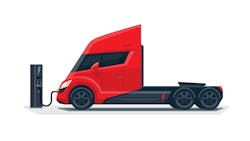On the surface having a variety of choices can seem like a good thing. However, the reality is that when faced with an abundance of choices some people feel too overwhelmed to make any choice. There are several names for this phenomenon: choice overload, decision paralysis, analysis paralysis and even the paradox of choice.
I think this can be applied to current — and future— powertrain options available to fleets. These are choices fleets face as they look to what will power the trucks of the future:
- Commercial battery electric vehicles
- Fuel cell hybrid electric vehicle
- Compressed natural gas
- Renewable natural gas
- Liquefied natural gas, propane,
- Hybrid diesel or natural gas electric
- Renewable diesel
It can seem overwhelming especially in light of the hype that fleets get bombarded with as both traditional truck makers and new entrants tout the superiority of their offerings.
What has resulted is that some fleets have simply opted not to decide. Whether it is fear of making the wrong decision or just being overwhelmed with so many options, some fleets are taking a wait and see attitude when it comes to these powertrain options.
But here’s the thing, in the short-term we do not see any one single “winner.” The North American Council on Freight Efficiency (NACFE) has coined the phrase “the messy middle” when it comes to what the short-term future of alternative fuel technologies for medium- and heavy-duty trucks will look like. We define this as a time when there will be many solutions available as a bridge to what we see an all-electric future.
So, what does that mean for fleets? I contend that sitting on the sidelines is not the best choice. It is time to start researching the various options keeping in mind that not all options make sense in every application. This means the task of whittling down the list is not as daunting as it might first seem. Some basic preliminary research should help you find the choices that make sense given your duty cycle, location, routing, etc.
Once you’ve narrowed the list down to technologies that you have some confidence are right for your fleet, start testing them to see how they perform in your real-world operation. These technologies are coming to the market and you need to start determining which ones make the most sense for you. Remember there is no one right or wrong answer.
And for manufacturers, help the fleets understand your technology and avoid pushing any solutions onto fleets or into applications where they are not best. That alone will truly help the fleets select the right application for their use and help you scale your solutions.
When it comes to choice overload I am reminded of a lyric from the Rush song "Freewill": “If you choose not to decide, you still have made a choice.”
When it comes to the powertrains of the future, not deciding is really not a good option.
About the Author

Michael Roeth
Executive Director
Michael Roeth is the executive director of the North American Council for Freight Efficiency. He serves on the second National Academy of Sciences Committee on Technologies and Approaches for Reducing the Fuel Consumption of Medium and Heavy-Duty Vehicles and has held various positions with Navistar and Behr/Cummins.
